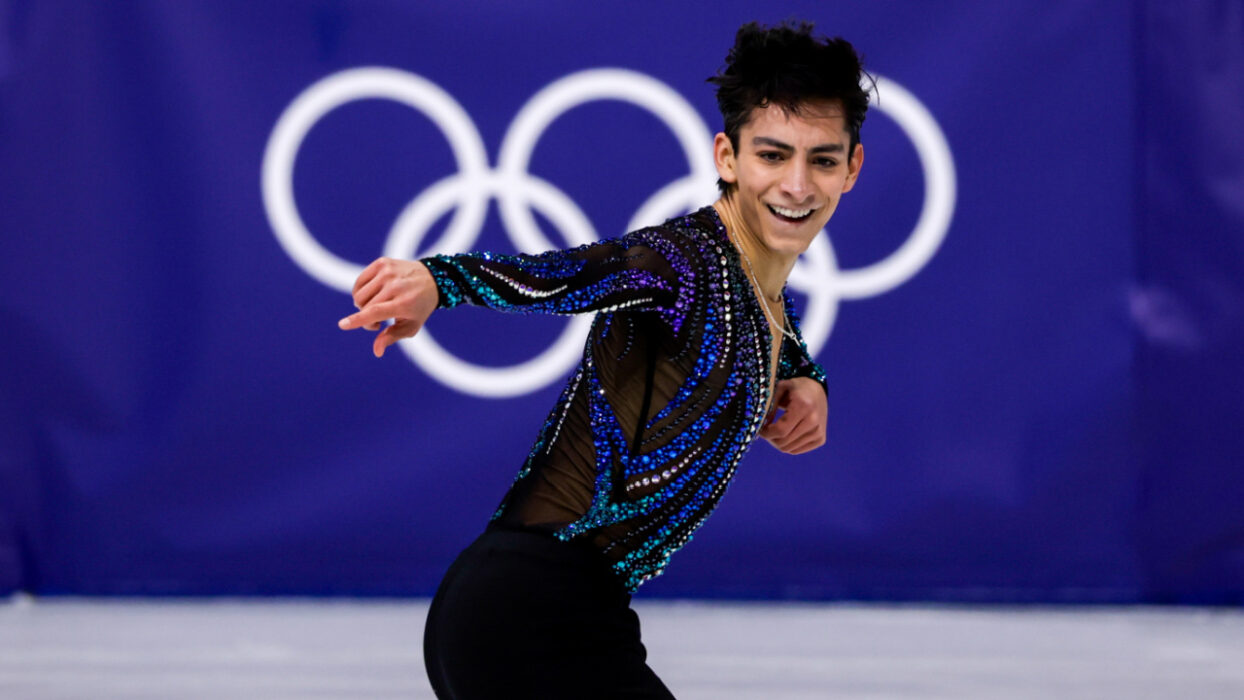
Shakira Is Famously Colombian-Lebanese And Her ‘Tongue Moment’ Meant A Lot For Middle Eastern Representation
[wam_bridtv playerid=”17922″ videoid=”516336″ width=”1100″ height=”618″]
Last night Shakira and Jennifer Lopez gave us one of the most iconic halftime show performances we’ve seen in a long time. Not only did they become the first Latinas to headline a Superbowl show, they also brought out the whole Latino Gang —Puerto Rican trap super star Bad Bunny, Colombian reggaeton king J Balvin, and J.Lo’s own little girl, Emme. The show was filled with subtle cultural statements —and one of them became a viral moment. Here’s what Shakira’s tongue flicking gesture actually means.
Sunday night’s half time show was nothing short of iconic.
Shakira and JLo performed their biggest hits, including “Waka Waka,” “Let’s get Loud,” and a few others. They brought Bad Bunny on stage to perform Cardi B’s “I Like It,” and his own hit “Callaita,” anchored by Shak. J Balvin also joined in on the spectacle with his massive hit “Mi Gente.”
The Grammy Award-winner was just launching into her hit song “Hips Don’t Lie” when the viral moment happened.
Shakira leaned down toward one of the cameras at Hard Rock Stadium in Miami Gardens, Fl, stuck out her tongue and let out a high-pitched, warbling cry that instantly set the internet in flames.
Viewers were quick to ridicule the singer, and the memes started rolling out.
Countless memes likened her to a turkey, a petulant toddler and characters from Nickelodeon’s “SpongeBob SquarePants”, among a host of other unflattering comparisons. But a few of Shakira’s true fans pointed out the obvious; the sound was a nod to her Lebanese heritage.
If you’ve followed Shakira’s career since the late 90s you might remember that the artist is inspired by her Middle Eastern roots.
Born Shakira Isabel Mebarak Ripoll, to a Colombian mother and Lebanese father, the singer has drawn on her diverse cultural heritage to create her signature style —both vocally and stylistically. I mean come on, it’s her Lebanese background what inspired her belly-dancing and hip-swaying moves —duh.
Shakira’s widely celebrated performance was full of nods to her Colombian and Lebanese heritage.
The seemingly random gesture actually carried deep cultural significance. To those familiar with Middle Eastern culture, the sound was akin to a traditional Arabic expression of joy and celebration called a zaghrouta. It was also interpreted as a reference to the world-famous Carnaval de Barranquilla, which is held in Shakira’s hometown in Colombia.
In the beginning of the 2000s Rolling Stone magazine wrote about what made Shakira stand out
“The stylistic breadth of Shakira’s music – elements of folk, Middle Eastern and traditional Latin styles over a foundation of rock and pop – gave her a degree of credibility the American teen queens lacked.” Shakira’s breakout single, which many Latinx millennials might remember from the 90s, was ‘Ojos Así’, a song heavily inspired by the middle eastern world —The Colombian even sings in Arabic.
Her Latin sound has always been spiced with Middle Eastern elements and Colombia’s African heritage.
The salsa beats in her 2006 megahit “Hips Don’t Lie” are reggaeton-inspired, and it also has an Afrocolombian element to it. The singer she still featured a belly dancing arab-esque number in the video. The same mixture of cultures has been fed into countless of the artists biggest hits, like ‘Tortura,’ ‘Yo soy Gitana,’ ‘Whenever Wherever’, and the list goes on. Her own vocal style was also born from this melting-pot of cultures. Shakira has noted the importance of her sense of “mixed ethnicity,” saying “I am a fusion. That’s my persona. I’m a fusion between black and white, between pop and rock, between cultures – between my Lebanese father and my mother’s Spanish blood, the Colombian folklore and Arab dance…”
Shakira’s music stems from years of listening to Anglo and U.S. rock acts like Led Zeppelin, The Cure, The Beatles and Nirvana.
“I was so in love with that rock sound,” Shakira explained to BMI in 2002, “but at the same time because my father is of 100 percent Lebanese descent, I am devoted to Arabic tastes and sounds. Somehow, I’m a fusion of all of those passions and my music is a fusion of elements that I can make coexist in the same place, in one song.”
Fans praised her for including such a wide array of elements in the halftime performance.
One person wrote, “In the melting pot that is Miami, you could not have picked a better Super Bowl act and this was a lovely touch.” Another fan tweeted: “Shakira sung in Arabic, Spanish, English. She played the guitar and the drums. She danced champeta, pop, salsa, reggaeton, son de negro, mapalé and arab dance.” The twitter user added, “And her 2-year-old songs are top 10 on USA iTunes. SHAKIRA, SHAKIRA.”
Shakira has long been an icon for Middle Eastern Americans, especially the ones with Latinx backgrounds too.
“Shakira was all we had for the longest time,” one person tweeted. “Every Middle Eastern American, especially Lebanese, pointed to Shakira as the one entertainer with massive global appeal and popularity. To have our culture and our rhythms represented up there, even in the smallest way, is massive.”
Beyond the spectacle of glittery costumes, laser lights and high-energy dancing, the show was an impactful 15-minute-long homage to the singers’ roots.
Shakira peppered her performance with Middle Eastern music and belly dancing while also incorporating elements of Latin American culture and traditional Afro Colombian and Latino dances. Jennifer Lopez, born in the Bronx to Puerto Rican parents, sang her chart-topping anthem “Jenny From the Block” and later wore the U.S. territory’s flag as a reversible cape featuring the flag of Puerto Rico on the other face of it.
The show was filled with significant, yet subtle, cultural and political statements.
While performing a remix of “Waka Waka (This Time For Africa)” and “Let’s Get Loud,” many young singers appeared on stage in circular cages—a subtle reference, but a possible nod to the thousands of children, most from Latin American countries, who have been detained at the border due to the migratory crisis and current administration’s family separation policy. The Puerto Rican flag flashed as the iconic Springsteen ‘Born In The USA’ song played, as if to remind viewers that Puerto Ricans are American citizens.
Lopez and Shakira’s performance was primarily a celebration of Latin American music and their own lengthy careers, but the subtle references to politics might serve as a guide for what the NFL will be like in the Jay Z era.




